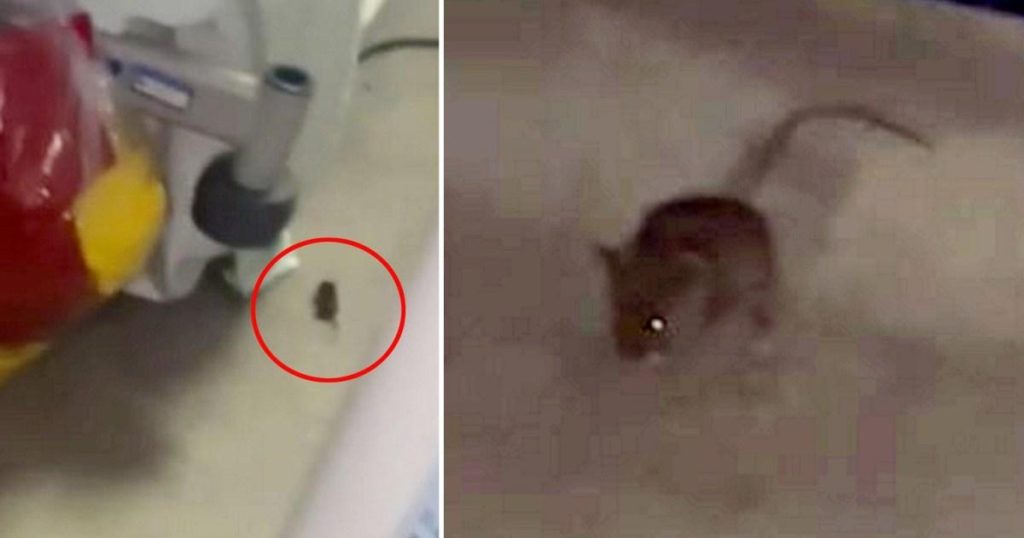A Deep Dive into the Rodent Infestation Crisis at Walsall Manor Hospital
Walsall Manor Hospital finds itself embroiled in a disturbing controversy as patients raise alarming concerns about a pervasive rodent infestation within the facility. The issue came to light after a patient, Daniel Hendron, captured video footage of a large mouse scurrying beneath his bed. This incident ignited a wave of complaints from patients who describe the hospital as being "infested" with mice.
Daniel, a 32-year-old father of three, was admitted to the hospital for treatment of a leg infection. However, his stay has been far from restful, plagued by the constant presence of mice. He reports seeing multiple mice at any given time, emerging from radiators, wall crevices, and other access points. The nocturnal scurrying and screeching of the rodents have made sleep impossible, turning his hospital stay into a nightmare.
The infestation’s impact extends beyond mere discomfort. Daniel expresses serious concerns about the hygiene and safety of the environment, particularly given his open wound. He fears the potential for infection and even the possibility of mice directly interacting with his injury. The psychological toll is also evident, as he describes feeling trapped and anxious, resorting to using a bedpan rather than venturing to the restroom due to his fear of encountering mice.
Daniel’s complaints paint a picture of systemic neglect and a delayed response from hospital staff. He alleges that nurses have confided in him about reporting the infestation as early as November, yet no effective measures seem to have been taken. He claims that some nurses are even hesitant to enter the affected ward due to their own fear of the rodents. This raises serious questions about the hospital’s commitment to patient and staff safety and well-being.
The hospital’s response has been met with skepticism and criticism. While acknowledging the issue and apologizing for the distress caused, their statement about implementing pest control measures and increased cleaning lacks concrete details and demonstrable outcomes. Daniel’s continued posting of videos showing mice in patient areas and near medical equipment undermines the hospital’s claims of effective action. The situation raises serious doubts about the adequacy and timeliness of their response.
This incident at Walsall Manor Hospital highlights broader concerns about hygiene and safety standards within the National Health Service (NHS). Against the backdrop of other recent NHS controversies, such as a cleaner receiving a substantial payout after extensive sick leave and concerns about drug-resistant superbugs from the Ukrainian battlefield potentially impacting the NHS, this rodent infestation adds another layer of complexity. It underscores the challenges faced by the NHS in maintaining consistent standards of care and the urgent need for increased accountability and transparency.
A Closer Look at Patient Concerns and Hospital Response
The heart of this issue lies in the stark contrast between patient experiences and the hospital’s official response. Daniel’s detailed account of the infestation, corroborated by video evidence, paints a picture of a serious and ongoing problem. His descriptions of mice scurrying around patient beds, under medical equipment, and emerging from various access points highlight the extent of the infestation. The psychological impact on patients, forced to share their healing space with rodents, is undeniable.
The hospital’s statement, while acknowledging the issue, falls short of reassuring patients and addressing the core concerns. The vague reference to "pest control measures" and "increased cleaning" lacks specifics about the nature and effectiveness of these actions. Without concrete evidence of a robust and comprehensive response, the hospital’s claims appear hollow in the face of persistent patient complaints and video documentation of ongoing rodent activity.
The alleged delay in addressing the issue, with reports of staff awareness dating back to November, raises serious questions about the hospital’s responsiveness and commitment to patient well-being. The reported reluctance of some nurses to enter the affected ward due to their own fear of mice further underscores the perceived severity of the problem and the apparent lack of effective action.
The Broader Implications for the NHS
This incident at Walsall Manor Hospital serves as a microcosm of larger challenges facing the NHS. Against the backdrop of a strained healthcare system, issues like this rodent infestation underscore the difficulty in maintaining consistent standards of hygiene, safety, and patient care. It also highlights the importance of robust reporting mechanisms and timely responses to patient complaints.
The case resonates with other recent NHS controversies, such as the large payout to a cleaner with a history of extensive sick leave and concerns about the potential impact of drug-resistant superbugs from the Ukrainian battlefield. These diverse incidents point to systemic issues within the NHS, including staffing challenges, resource allocation, and the need for improved oversight and accountability.
The Need for Transparency and Accountability
The rodent infestation at Walsall Manor Hospital calls for increased transparency and accountability from the NHS. A thorough and independent investigation is necessary to determine the full extent of the problem, the effectiveness of the hospital’s response, and any systemic factors that contributed to the situation. The results of this investigation should be made public to restore patient trust and ensure that appropriate corrective actions are taken.
Beyond this specific incident, the NHS needs to strengthen its mechanisms for addressing patient complaints and ensuring accountability at all levels. This includes clear protocols for reporting and investigating hygiene and safety concerns, as well as robust systems for tracking and monitoring corrective actions.
The Human Cost of Negligence
Ultimately, the rodent infestation at Walsall Manor Hospital represents a failure to prioritize patient well-being and dignity. Patients, already vulnerable due to their health conditions, are subjected to further distress and potential health risks due to the unsanitary environment. The psychological impact of sharing their healing space with rodents cannot be overstated.
The incident serves as a stark reminder that hospitals are not just buildings; they are spaces where people seek healing and comfort. When basic standards of hygiene and safety are compromised, the very foundation of patient care is undermined.
Moving Forward: Towards a Safer and More Responsive NHS
The rodent infestation crisis at Walsall Manor Hospital presents an opportunity for the NHS to learn and improve. By acknowledging the severity of the issue, taking swift and decisive action, and implementing robust preventative measures, the NHS can demonstrate its commitment to patient safety and well-being.
This incident underscores the importance of proactive measures to prevent such infestations from occurring in the first place. Regular inspections, comprehensive pest control programs, and ongoing staff training are essential for maintaining a safe and hygienic environment. Equally important is fostering a culture of openness and responsiveness to patient concerns, where complaints are taken seriously and addressed promptly.
The rodent infestation at Walsall Manor Hospital is not just an isolated incident; it reflects broader challenges within the NHS. By addressing these challenges head-on, the NHS can rebuild public trust and ensure that all patients receive the quality care they deserve in a safe and dignified environment.











